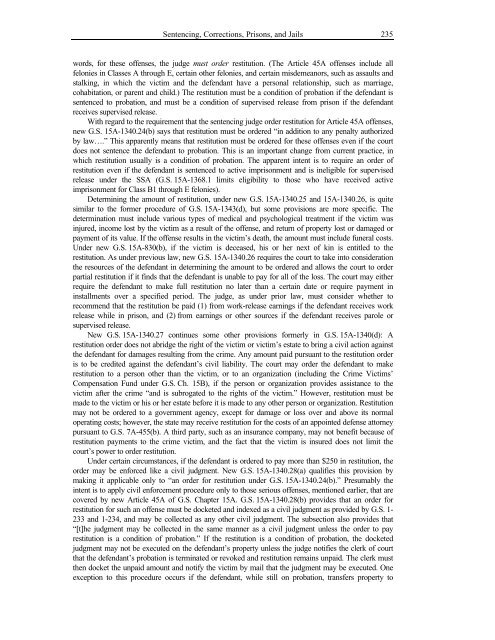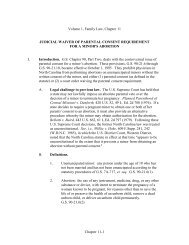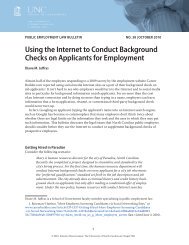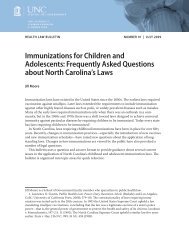Sentencing, Corrections, Prisons, and Jails - School of Government ...
Sentencing, Corrections, Prisons, and Jails - School of Government ...
Sentencing, Corrections, Prisons, and Jails - School of Government ...
Create successful ePaper yourself
Turn your PDF publications into a flip-book with our unique Google optimized e-Paper software.
<strong>Sentencing</strong>, <strong>Corrections</strong>, <strong>Prisons</strong>, <strong>and</strong> <strong>Jails</strong> 235<br />
words, for these <strong>of</strong>fenses, the judge must order restitution. (The Article 45A <strong>of</strong>fenses include all<br />
felonies in Classes A through E, certain other felonies, <strong>and</strong> certain misdemeanors, such as assaults <strong>and</strong><br />
stalking, in which the victim <strong>and</strong> the defendant have a personal relationship, such as marriage,<br />
cohabitation, or parent <strong>and</strong> child.) The restitution must be a condition <strong>of</strong> probation if the defendant is<br />
sentenced to probation, <strong>and</strong> must be a condition <strong>of</strong> supervised release from prison if the defendant<br />
receives supervised release.<br />
With regard to the requirement that the sentencing judge order restitution for Article 45A <strong>of</strong>fenses,<br />
new G.S. 15A-1340.24(b) says that restitution must be ordered “in addition to any penalty authorized<br />
by law….” This apparently means that restitution must be ordered for these <strong>of</strong>fenses even if the court<br />
does not sentence the defendant to probation. This is an important change from current practice, in<br />
which restitution usually is a condition <strong>of</strong> probation. The apparent intent is to require an order <strong>of</strong><br />
restitution even if the defendant is sentenced to active imprisonment <strong>and</strong> is ineligible for supervised<br />
release under the SSA (G.S. 15A-1368.1 limits eligibility to those who have received active<br />
imprisonment for Class B1 through E felonies).<br />
Determining the amount <strong>of</strong> restitution, under new G.S. 15A-1340.25 <strong>and</strong> 15A-1340.26, is quite<br />
similar to the former procedure <strong>of</strong> G.S. 15A-1343(d), but some provisions are more specific. The<br />
determination must include various types <strong>of</strong> medical <strong>and</strong> psychological treatment if the victim was<br />
injured, income lost by the victim as a result <strong>of</strong> the <strong>of</strong>fense, <strong>and</strong> return <strong>of</strong> property lost or damaged or<br />
payment <strong>of</strong> its value. If the <strong>of</strong>fense results in the victim’s death, the amount must include funeral costs.<br />
Under new G.S. 15A-830(b), if the victim is deceased, his or her next <strong>of</strong> kin is entitled to the<br />
restitution. As under previous law, new G.S. 15A-1340.26 requires the court to take into consideration<br />
the resources <strong>of</strong> the defendant in determining the amount to be ordered <strong>and</strong> allows the court to order<br />
partial restitution if it finds that the defendant is unable to pay for all <strong>of</strong> the loss. The court may either<br />
require the defendant to make full restitution no later than a certain date or require payment in<br />
installments over a specified period. The judge, as under prior law, must consider whether to<br />
recommend that the restitution be paid (1) from work-release earnings if the defendant receives work<br />
release while in prison, <strong>and</strong> (2) from earnings or other sources if the defendant receives parole or<br />
supervised release.<br />
New G.S. 15A-1340.27 continues some other provisions formerly in G.S. 15A-1340(d): A<br />
restitution order does not abridge the right <strong>of</strong> the victim or victim’s estate to bring a civil action against<br />
the defendant for damages resulting from the crime. Any amount paid pursuant to the restitution order<br />
is to be credited against the defendant’s civil liability. The court may order the defendant to make<br />
restitution to a person other than the victim, or to an organization (including the Crime Victims’<br />
Compensation Fund under G.S. Ch. 15B), if the person or organization provides assistance to the<br />
victim after the crime “<strong>and</strong> is subrogated to the rights <strong>of</strong> the victim.” However, restitution must be<br />
made to the victim or his or her estate before it is made to any other person or organization. Restitution<br />
may not be ordered to a government agency, except for damage or loss over <strong>and</strong> above its normal<br />
operating costs; however, the state may receive restitution for the costs <strong>of</strong> an appointed defense attorney<br />
pursuant to G.S. 7A-455(b). A third party, such as an insurance company, may not benefit because <strong>of</strong><br />
restitution payments to the crime victim, <strong>and</strong> the fact that the victim is insured does not limit the<br />
court’s power to order restitution.<br />
Under certain circumstances, if the defendant is ordered to pay more than $250 in restitution, the<br />
order may be enforced like a civil judgment. New G.S. 15A-1340.28(a) qualifies this provision by<br />
making it applicable only to “an order for restitution under G.S. 15A-1340.24(b).” Presumably the<br />
intent is to apply civil enforcement procedure only to those serious <strong>of</strong>fenses, mentioned earlier, that are<br />
covered by new Article 45A <strong>of</strong> G.S. Chapter 15A. G.S. 15A-1340.28(b) provides that an order for<br />
restitution for such an <strong>of</strong>fense must be docketed <strong>and</strong> indexed as a civil judgment as provided by G.S. 1-<br />
233 <strong>and</strong> 1-234, <strong>and</strong> may be collected as any other civil judgment. The subsection also provides that<br />
“[t]he judgment may be collected in the same manner as a civil judgment unless the order to pay<br />
restitution is a condition <strong>of</strong> probation.” If the restitution is a condition <strong>of</strong> probation, the docketed<br />
judgment may not be executed on the defendant’s property unless the judge notifies the clerk <strong>of</strong> court<br />
that the defendant’s probation is terminated or revoked <strong>and</strong> restitution remains unpaid. The clerk must<br />
then docket the unpaid amount <strong>and</strong> notify the victim by mail that the judgment may be executed. One<br />
exception to this procedure occurs if the defendant, while still on probation, transfers property to













